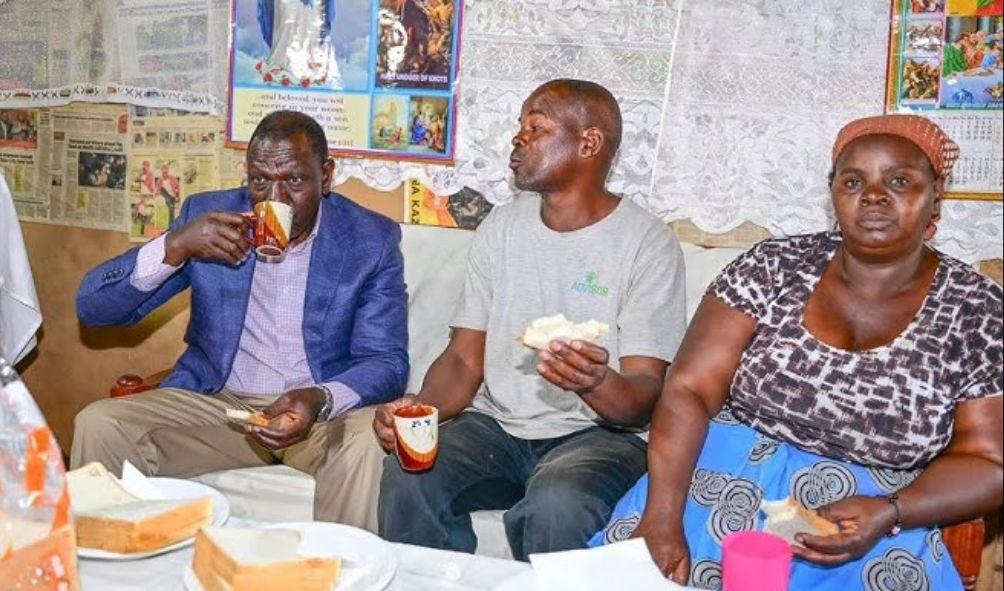Ruto’s Politics of Tea and Bread: Genuine Connection or Strategic Tokenism?
President William Ruto and Deputy President Rigathi Gachagua have shifted from their past approach of seeking political favor through religious displays to a more personalized connection, appearing in the homes of everyday Kenyans.
Over the last two weeks, photos have emerged of the leaders sharing meals in modest, semi-permanent homes, primarily with women. On August 9, 2024, during a tour in Murang’a County, they visited Ms. Miriam Njeri’s home in Mathioya.
After ensuring only their official photographers were present, they shared images of themselves enjoying bread and tea. President Ruto also discussed the country’s 2024 electricity policy with her, followed by a prayer from Ms. Njeri.
A background voice is heard suggesting a donation of Sh300,000 to her for her hospitality, to which she responded with more prayers, asking for divine protection over the leaders.
These photo-ops have become frequent, especially during their recent visits to Mt. Kenya and the Gusii region, reflecting a well-established pattern for President Ruto.
His 2022 campaign focused heavily on identifying with the common person, from roadside vendors to boda boda riders, building a narrative that resonated with voters over powerful state machinery and an elite opposition backed by former President Uhuru Kenyatta.
Ruto’s journey began humbly, from selling chickens in Turbo to challenging established political figures like Reuben Chesire in 1997, despite Chesire being President Moi’s preferred candidate.
This underdog story has defined his political path, marked by consistent election victories, except for the 2010 constitutional referendum.
ALSO READ:
- “Two Groups, One Agenda”: Gachagua Accuses Raila of Secret Political Deals
- Exclusive: Ida Odinga’s 75th Birthday Party in Karen (Photos)
- FKF President Discloses Exact Amount Paid to Harambee Stars Players
- Gachagua’s Ally Senator John Methu Admits Ruto Might Win 2027 Elections
- Maraga Explains Why He Hasn’t Campaigned in Kisii Despite 2027 Bid
Even Ms. Njeri’s prayer reflects a continuation of Ruto’s long history of using religious platforms as a cornerstone of his political strategy, dating back to his alliance with Uhuru Kenyatta in 2013.
Deputy President Gachagua has also mastered the art of positioning himself as a man of the people, frequently seen engaging with locals in his home constituency of Mathira, sharing simple meals in rustic settings, and taking community walks.
However, this populist approach is being increasingly scrutinized. The Gen Z-led protests in June demanded policies that serve all citizens and highlighted the disconnect between politicians’ publicized displays of humility and their lavish lifestyles. Protesters also voiced their rejection of using religious platforms for political gain.
Yet, some citizens feel the encounters are life-changing. Ms. Margaret Njambi from Murang’a County credits meeting President Ruto in 2021 for drastically improving her life after receiving substantial financial aid.
But not all promises are kept; Njambi, for instance, is still waiting for the livestock she was promised.
Similarly, Ms. Elizabeth Mugure recalls a spontaneous encounter with the president during his Kirinyaga visit, where she was handed an envelope with Sh100,000, leaving her unwaveringly loyal.
ALSO READ: State House: Why President Ruto is Relaunching Projects
There are, however, orchestrated aspects to these encounters. Michael Mwiti, 26, from Kiharu, reveals that he and others were paid to procure and present a goat to the president during a rally, enhancing the event’s optics while securing financial rewards for themselves.
In another instance, Ruto and Gachagua were photographed sharing a meal in the humble home of Ms. Yunuke Nyanchongi in Kisii County, continuing the trend of connecting with grassroots communities.
Political analysts like Gasper Odhiambo criticize these tactics as perpetuating a culture of tokenism that undermines genuine governance.
Odhiambo highlights the practice of publicly distributing bursary checks as another example of this approach, where unnecessary theatrics overshadow substantive assistance.
Githunguri MP Gathoni wa Muchomba echoes these concerns, pointing to cases like Mrs. Pauline Waithera Njoroge, who was once a prominent campaign figure for Ruto but has since been abandoned.
Despite being promised substantial rewards for her role in his campaign, she remains in hardship, dependent on smaller, private donations.
Public relations experts like Crispin Mwenda defend these tactics as essential components of political marketing, emphasizing that all strategies, from public donations to personal interactions, are fair in political campaigns.
Ruto’s Politics of Tea and Bread: Genuine Connection or Strategic Tokenism?
